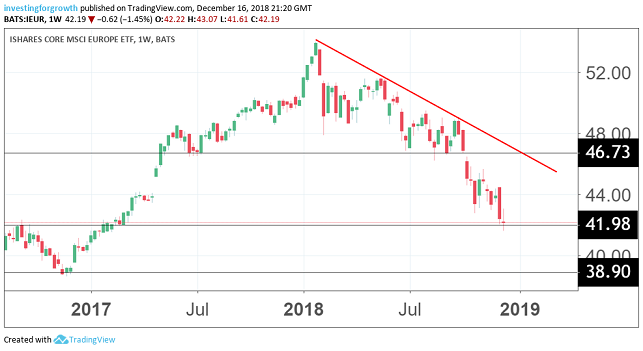European shares in 2019: This must happen before confidence returns
19th December 2018 09:02
by Graeme Evans from interactive investor
A promising start to 2018 unravelled over the 12 months, but there is potential in European stockmarkets, and stocks look cheap, writes Graeme Evans.

Just as things were starting to look up for Europe's economy and markets, the familiar sight of political risk has come back to haunt investors.
The eurozone kicked off 2018 with plenty of promise, buoyed by the fastest expansion in a decade during 2017 and expectations of another year of GDP growth of at least 2.3%. In January, the euro single currency stood at a three-year high against the US dollar.
But the optimism quickly faded, with high oil prices and trade tensions with the United States among factors leading to the rapid loss of confidence. Germany and France, the two powerhouses of the European economy, have been losing steam and are expected to continue to do so in 2019.
The average European fund fell by more than 7% in the first 11 months of the year, with investors clearly disappointed that the growth story that seemed so robust 12 months ago appeared to be flagging.
iShares Core MSCI Europe

Source: TradingView (*) Past performance is not a guide to future performance
What's been particularly alarming is that the region is again mired in political upheaval. As well as Brexit negotiations, there's crisis over Italy's efforts to restructure its €2.3 trillion debt pile and uncertainty over Germany’s political direction at the beginning of the end for the Angela Merkel era.
Merkel has dominated German and euro area politics since 2005 and, while she can stay as chancellor until 2021, this is far from certain after the collapse in support for her CDU party in recent state elections.
JP Morgan Cazenove's global equity strategists described the political landscape in the region as looking "very uncertain" at the end of 2018.
They added: "It might be unfair to say that 2018 was an unmitigated disaster for the euro area but the list of positives only contains labour market developments.
"Other activity indicators showed a steady decline in real GDP growth and core inflation. Moreover, politics provided market unfriendly surprises, starting from Italian politics but also including the loss of popularity for mainstream parties in Germany and France, and a change of government in Spain."
The European Central Bank's (ECB) new policy of enhanced forward guidance has at least provided a measure of certainty in an effort to ease the region through the end of quantitative easing. This includes a pledge not to raise the policy rate before next summer and to pursue a gradual path after that.
What's not so clear is who will replace influential ECB president Mario Draghi when his eight-year term ends in October.
Deutsche Bank thinks that the eventual tightening of monetary policy in the eurozone should not have negative consequences for growth. However, the bank only forecasts a rise of 1.7% for the eurozone bloc, with Germany at 1.3%.
Stefan Schneider, chief German economist at Deutsche Bank, adds that European equities look particularly inexpensive at present.
- The top 20 funds in Europe and potential winners in 2019
- Three good reasons why stockmarket investors must look beyond the UK
- Outlook for global equity markets in 2019
He said:
"As soon as the situation eases with regard to the Brexit negotiations or in the conflict with Italy, investors are likely to gain confidence and start buying again."
In Europe, Schneider highlighted the most attractive stocks as those in the basic resources, construction and financial services sectors, as well as oil and gas. Value stocks will generally be a focus of attention.
*Horizontal lines on charts represent levels of previous technical support and resistance. Trendlines are marked in red.
These articles are provided for information purposes only. Occasionally, an opinion about whether to buy or sell a specific investment may be provided by third parties. The content is not intended to be a personal recommendation to buy or sell any financial instrument or product, or to adopt any investment strategy as it is not provided based on an assessment of your investing knowledge and experience, your financial situation or your investment objectives. The value of your investments, and the income derived from them, may go down as well as up. You may not get back all the money that you invest. The investments referred to in this article may not be suitable for all investors, and if in doubt, an investor should seek advice from a qualified investment adviser.
Full performance can be found on the company or index summary page on the interactive investor website. Simply click on the company's or index name highlighted in the article.